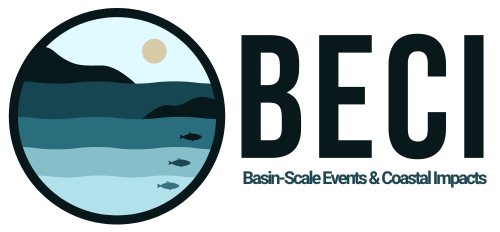news & events
Photo credit: Ocean Image Bank | Kimberly Jeffries
upcoming events
To be announced.
Previous events
BECI Science Plan
The BECI Science Plan is now available! Read it here.
Webinar | September 30 2024
Marine Ecosystem Model Ensembles to Support Regional Applications
VIRTUAL – September 30: US East Coast Time 16:00 (UTC-4) // US Pacific Coast Time 13:00 (UTC-7)
Presentation 1: Regional marine ecosystem models of the Fisheries and Marine Ecosystem Model Intercomparison Project (FishMIP)
As the urgency to evaluate the impacts of climate change on marine ecosystems increases, there is a need to develop robust projections and improve the uptake of ecosystem model outputs in policy and planning. FishMIP is a network of more than 100 marine ecosystem modellers and researchers around the world, aiming to better understand and project the impacts of climate change on fisheries and marine ecosystems. Currently the FishMIP ensemble comprises over 30 regional marine ecosystem models and we are striving towards regional model ensembles that support regional climate risk assessments and fisheries management adaptation plans. To achieve these objectives, we developed an implementation workflow to standardise the climate and fishing forcings used by regional models contributing to FishMIP and to facilitate comparative analyses across models and a wide range of regions. This workflow will facilitate the development of regional ensembles and enhance future research on marine ecosystem model development and applications, model evaluation and benchmarking, and global-to-regional model comparisons.
Presentation 2: Developing a Southern Ocean Marine Ecosystem Model Ensemble to assess climate risks and uncertainties
Climate change could irreversibly alter Southern Ocean ecosystems. Marine ecosystem model (MEM) ensembles can help policymakers by projecting future changes and assessing management approaches. However, projections from the Fisheries and Marine Ecosystem Model Intercomparison Project (FishMIP) global MEM ensemble reveal an uncertain future for the Southern Ocean, indicating a need for a region-specific ensemble. Significant model uncertainty arises from the Earth system models (ESMs) used to drive FishMIP models, particularly regarding future changes to lower trophic level biomass and sea-ice coverage. To enhance confidence in regional MEMs as tools for ecosystem-based management in a changing climate, we propose developing a Southern Ocean Marine Ecosystem Model Ensemble (SOMEME) as part of the FishMIP 2.0 regional model intercomparison initiative. A key challenge is balancing global standardized inputs with regional relevance. As a first step, we design a SOMEME simulation protocol that builds on and extends the FishMIP framework. This includes: detailed skill assessment of climate forcing variables for Southern Ocean regions, extending fishing data to include whaling, and new simulations assessing ecological links to sea-ice processes in an ensemble of candidate regional MEMs. These efforts will improve assessments of climate change impacts on Southern Ocean ecosystems.
This webinar series is jointly hosted by the UN Ocean Decade Programs Blue Food Futures, Fisheries Strategies for Changing Oceans and Resilient Ecosystems (FishSCORE), Sustainability, Predictability, and Resilience of Marine Ecosystems (SUPREME), Sustainability of Marine Ecosystems through Global Knowledge Networks (SmartNet), and Fisheries and Marine Ecosystem Model Intercomparison Project (FishMIP) and endorsed project Basin Scale Events to Coastal Impacts (BECI).
BECI Workshop | October 26 2024
2024 PICES Annual Meeting in Honolulu, Hawai'i
IN PERSON – Saturday October 26, 2024 from 9am – 5pm (HST) at the Honolulu Convention Centre
BECI is a multinational interdisciplinary project hosted by PICES that aims to provide forward-looking decision support for fisheries and ecosystem-based management in the North Pacific Ocean in a changing climate. We are building a collaborative network of modellers and practitioners in the North Pacific to advance ensemble modelling goals, including:
- To contribute to a North Pacific Ocean Marine Ecosystem Model Ensemble (NOMEME) that could be used to inform transboundary fisheries management under climate change, that links to other global and regional model intercomparison initiatives.
- To develop useful decision-support processes/tools for integrating climate/environmental drivers into fisheries and ecosystem models at regional scales specifically for the North Pacific.
The goals of this workshop include to:
- Engage with a community of species, fisheries, ecosystem, climate and oceanographic modellers working in the North Pacific;
- Discuss attributes and considerations of different models and ensemble initiatives in the North Pacific and identify best practices for ensemble development;
- Identify best practices for ensemble development and start developing a protocol for a North Pacific Ocean Marine Ecosystem Model Ensemble (NOMEME), including key standardisation factors, focal species/fisheries, management targets.
